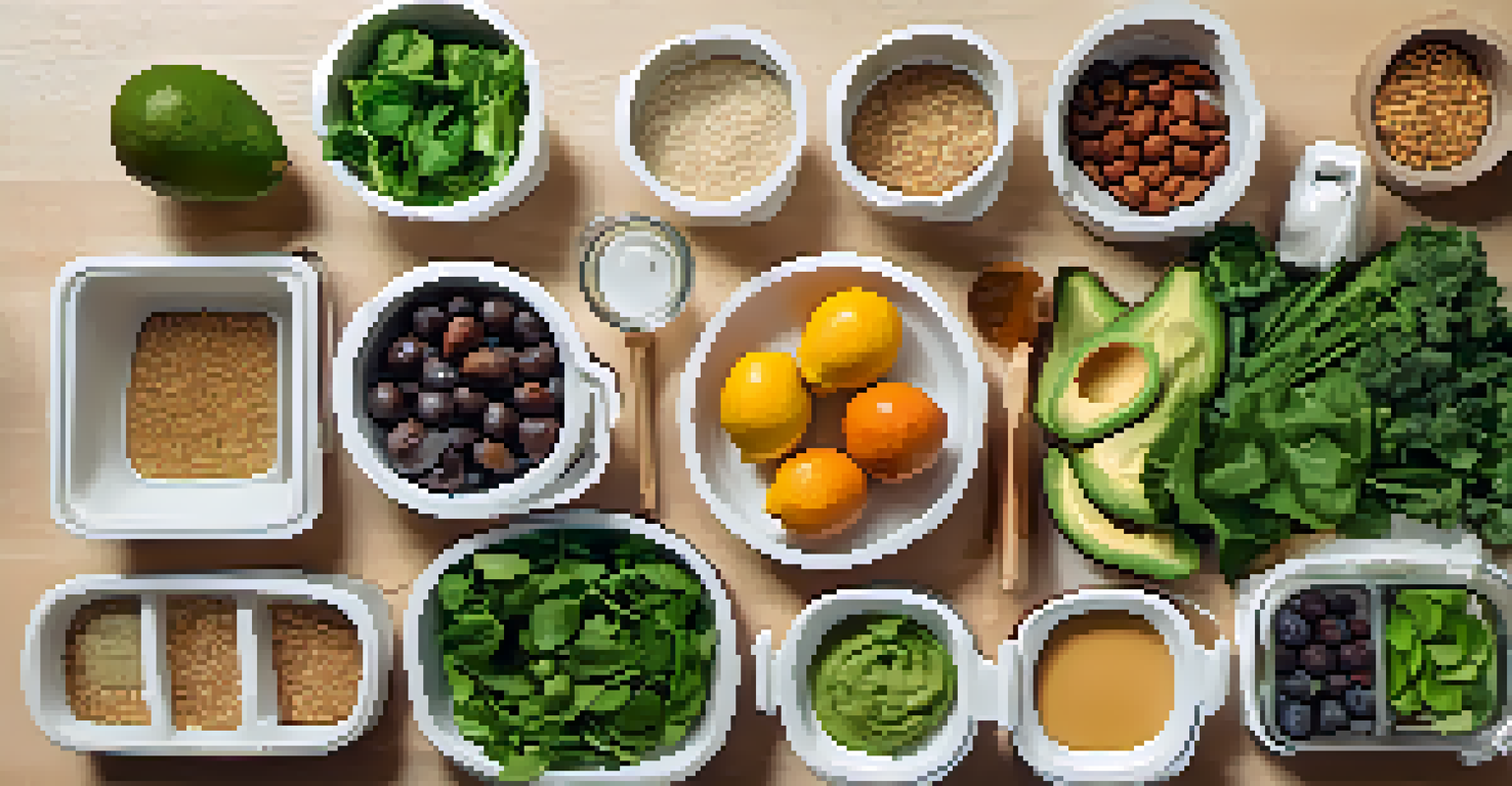The Role of Culinary Medicine in Managing Diabetes Effectively

What is Culinary Medicine and Its Importance?
Culinary medicine is an emerging field that blends the art of cooking with nutritional science. It emphasizes the importance of food in preventing and managing health conditions, including diabetes. By understanding the nutritional components of ingredients, individuals can make informed choices that positively impact their health.
Let food be thy medicine and medicine be thy food.
This approach not only focuses on what to eat but also how to prepare meals that are both delicious and nutritious. For those managing diabetes, culinary medicine offers practical solutions to incorporate healthy eating into daily life. It encourages individuals to view food as a form of medicine, which can be empowering.
Ultimately, culinary medicine provides the tools needed to create a balanced diet that supports blood sugar control and overall well-being. It emphasizes that cooking can be enjoyable and fulfilling, making healthy eating a sustainable lifestyle choice.
Understanding Diabetes and Its Dietary Needs
Diabetes is a chronic condition that affects how your body processes glucose, leading to high blood sugar levels. Managing diabetes requires careful attention to diet, as what you eat can significantly impact your blood sugar levels. Understanding the carbohydrates, proteins, and fats in your meals is essential for effective management.

For instance, complex carbohydrates such as whole grains can provide steady energy, while simple sugars can cause spikes in blood sugar. This knowledge helps individuals make better choices about their meals and snacks, focusing on foods that stabilize their blood sugar. A well-balanced diet is crucial for maintaining energy levels and preventing complications.
Culinary Medicine Empowers Health
By blending cooking with nutritional science, culinary medicine helps individuals manage health conditions like diabetes through informed food choices.
Moreover, understanding the glycemic index—the ranking of carbohydrates based on their impact on blood sugar—can inform meal planning. By choosing foods with a lower glycemic index, individuals can better manage their diabetes while still enjoying a variety of flavors.
How Culinary Medicine Supports Diabetes Management
Culinary medicine plays a vital role in diabetes management by teaching individuals how to prepare meals that align with their dietary needs. It promotes the use of fresh, whole ingredients that are rich in nutrients and low in processed sugars. This shift not only enhances health but can also make meal preparation a fun and engaging activity.
The greatest wealth is health.
For example, cooking classes focused on diabetic-friendly recipes can empower individuals to take charge of their health. Participants learn to create meals that are both flavorful and suitable for their condition, fostering a sense of community and support. This hands-on experience can build confidence in the kitchen and encourage healthier eating habits.
Additionally, culinary medicine encourages meal planning and mindful eating, which are essential strategies for managing diabetes. By being intentional about food choices, individuals can develop a better relationship with food and reduce the stress often associated with meal times.
The Role of Whole Foods in Diabetes Diets
Whole foods, such as fruits, vegetables, whole grains, and lean proteins, are central to culinary medicine and diabetes management. These foods are minimally processed and retain their natural nutrients, which can help regulate blood sugar levels. Incorporating a variety of whole foods into meals ensures a balanced intake of vitamins and minerals.
For instance, leafy greens like spinach and kale are not only low in calories but also high in fiber, which aids digestion and helps control blood sugar. On the other hand, healthy fats from sources like avocados and nuts can improve heart health, which is especially important for those with diabetes.
Whole Foods Support Blood Sugar
Incorporating whole foods into meals aids in regulating blood sugar levels and ensures a balanced intake of essential nutrients.
Culinary medicine encourages individuals to experiment with different whole foods, discovering new flavors and textures. This exploration can make healthy eating exciting and sustainable, leading to long-term success in managing diabetes.
Meal Planning and Preparation Strategies
Effective meal planning is a cornerstone of managing diabetes, and culinary medicine offers practical strategies to simplify this process. Planning meals ahead of time not only saves money but also reduces the temptation to reach for unhealthy options when hunger strikes. By preparing balanced meals in advance, individuals can better control their blood sugar levels.
One strategy involves batch cooking healthy dishes that can be easily reheated during the week. This approach allows for variety while ensuring that meals are nutritious and compliant with dietary needs. For example, preparing a large pot of vegetable soup can provide several meals packed with fiber and essential nutrients.
Additionally, culinary medicine encourages individuals to create a grocery list based on their meal plans. This simple step can help avoid impulse purchases and ensure that only healthy ingredients make it into the cart, setting the stage for successful meal preparation.
Mindful Eating: A Key Component in Diabetes Care
Mindful eating is an essential aspect of managing diabetes, and culinary medicine promotes this practice through awareness and intention. By slowing down and savoring each bite, individuals can improve their relationship with food and make more conscious choices. This approach not only enhances the dining experience but also aids in recognizing hunger and fullness cues.
For example, rather than eating in front of a screen, taking the time to enjoy a meal at the table can foster appreciation for the food. This practice can lead to better digestion and help prevent overeating, which is crucial for managing blood sugar levels.
Community Enhances Diabetes Care
Engaging with community support through cooking classes and workshops fosters motivation and shared learning for effective diabetes management.
Culinary medicine encourages individuals to tune into the flavors, textures, and aromas of their meals, making the act of eating more satisfying. This holistic approach to food can transform how individuals perceive their meals, turning healthy eating into a pleasurable experience.
Community Support and Resources in Culinary Medicine
Community support is invaluable in the journey of managing diabetes, and culinary medicine often emphasizes group learning and shared experiences. Local cooking classes, workshops, and support groups can provide a sense of belonging and motivation. Engaging with others who are on a similar journey can foster encouragement and the sharing of tips and recipes.
Additionally, many resources are available, such as online platforms that offer meal planning tools, recipes, and forums for discussion. These resources can empower individuals to take control of their health and make informed decisions about their diet. Connecting with healthcare professionals who specialize in culinary medicine can further enhance understanding and application.

Ultimately, being part of a supportive community can make a significant difference in managing diabetes. It reinforces the idea that individuals are not alone in their journey, encouraging them to share successes and challenges alike.